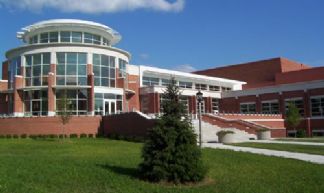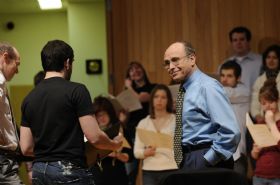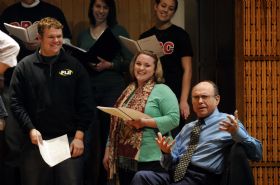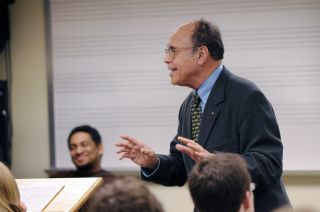Music of the 21st Century
March 20, 2009
The DePauw University School of Music, one of the oldest schools of music in the country, will celebrate its 125th anniversary this fall. Its long, rich history includes a unique and inspiring event for students: The Contemporary Music Festival. Since the Festival’s revival in 2002, its name has been updated to the Music of the 21st Century. The Festival, which was held Feb. 25 to March 1, 2009, is an annual residency that brings internationally renowned contemporary composers to campus for five days.
Cassel Grubb, former School of Music director and professor emeritus of music, says that the Festival began in 1962 with the help of Donald White, also a former director and professor of theory and composition. The Indiana Arts Commission funded the Festival for many years. The Festival is now underwritten by Robert A. and Margaret A. Schmidt, '69, '69.

“The Festival is a very valuable thing. It’s a great incentive for students to have the opportunity to work closely with the composers,” Grubb says. “Aaron Copland in 1971 was probably the most famous composer who came to DePauw. We worked to get him for a couple of years, and when our dates finally worked with his, it happened. He was a marvelous man.”
Click here to read more about Copland's visit during DePauw's first Winter Term.
Other notable composers at past festivals included Vincent Persichetti and Howard Hanson.
Professor of Music Amy Lynn Barber is responsible for re-initiating the Festival in 2002 after a brief hiatus. Composers Chen Yi and George Crumb are among the more recent guests. This year the Festival hosted composer-in-residence Samuel Adler.
Barber says, “Samuel Adler is a master craftsman. He is influential as a teacher and great as a composer. Adler is encouraging, nurturing and offers suggestions. The goal is for students to understand the creative process by seeing the mind of a composer at work." She continues, “Working with the composer makes the music come alive like nothing else can. It brings the black ink to life.” 
The Festival’s schedule of events is always impressive, offering students and faculty members five days of interaction with the composer. Adler attended several music classes; orchestra, band and choir rehearsals; coachings; master classes, and two concerts. Professor Barber points out that like most events in the School of Music, Festival concerts as well as master classes are free and open to the public.
Scott C. Spiegelberg, associate professor of music explains, “Master classes are student performances that are critiqued by the visiting artist in front of an audience.” Adler attended two master classes. In the composition master class, recordings of student compositions were played while everyone followed along with scores. Adler offered suggestions about how to improve the compositions. In the performance master class, students performed works by Adler, and he gave suggestions for how to improve their performances.
Coachings are similar to master classes except they are not done in front of an audience and are usually in preparation for a later public performance.
Rebecca L. Janvrin ’10, a vocal performance and history major, was very pleased to participate in the Festival this year. “I benefited greatly from the experience. I performed music that I composed, which  Adler critiqued in a master class. The music was my own three pieces that were Emily Dickinson poems that I set for soprano and piano.” Janvrin continues, “Few people had ever heard my work before, and I was in front of an internationally recognized composer, who was critiquing my amateur compositions!”
Adler critiqued in a master class. The music was my own three pieces that were Emily Dickinson poems that I set for soprano and piano.” Janvrin continues, “Few people had ever heard my work before, and I was in front of an internationally recognized composer, who was critiquing my amateur compositions!”
Janvrin says, “Dr. Adler gave me some great comments as well as general advice on music, composition and life. The Festival was a lot of work but also a lot of fun, and I hope that future Festivals have the same amount of interaction between guest composer and students. It's great to have these wonderful opportunities at my age.
“Dr. Adler was very encouraging in an environment that could have been really intimidating and nerve-wracking for us young composers."
Jeremy J. Eberhard ’10, a violinist and music education major, has participated in the Festival for two years. “After working with the composers, I look at music and know that every single mark is there for a reason. I attended the coachings, and they were awesome. Adler is a great teacher.”
a reason. I attended the coachings, and they were awesome. Adler is a great teacher.”
Honor Scholar Keely A. Nearpass ’09 will graduate this spring with a Bachelor of Musical Arts degree and a minor in English literature. Nearpass plays the French horn and plans to attend graduate school in the fall to pursue a master’s degree in performance.
Nearpass fell in love with classical music at an early age but appreciates this unique opportunity to better understand contemporary music. “There is so much new music that doesn’t have a lot of exposure. Bringing contemporary composers to campus helps us see the relevance of their music and makes us appreciate the music more because we understand it better,” she says.
"The Music of the 21st Century Festival is an incredible opportunity because all students have access to the composers,” Nearpass concludes.
Back